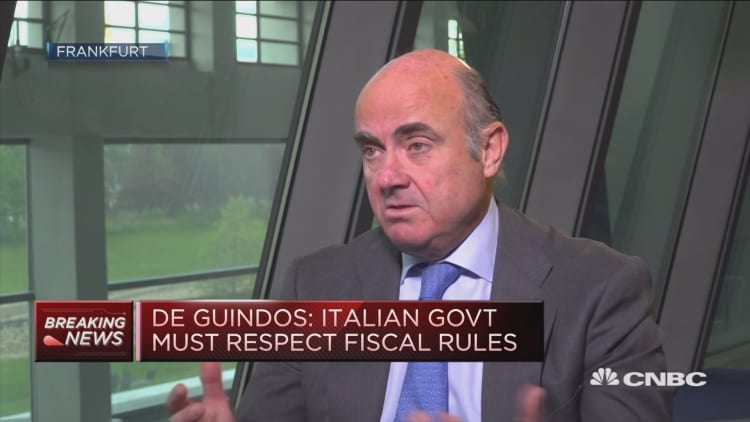
The vice president of the euro zone's central bank said Italy would be rewarded with lower borrowing costs if they delivered a more balanced budget and stuck to the EU's fiscal rules.
A long-running saga between Brussels and Rome spilled over into financial markets again this week, following reports the euro zone's third-largest economy could soon face disciplinary steps from the EU.
Late last year, Italy narrowly avoided a disciplinary procedure over its public finances, eventually agreeing to a "borderline" deal with the European Commission — the EU's executive arm.
Speaking to CNBC's Annette Weisbach on Wednesday, Luis de Guindos, vice president of the European Central Bank, said Italy had a current account surplus indicating it was competitive, but also had negatives such as hefty levels of public debt and low growth.
"I think that the recipe for Italy is quite, quite obvious," he said about recent comments on reforms from politicians in Rome.
"They have to respect the fiscal rules. And whenever there is an agreement between the Commission and the Italian governments you see immediately that, you know, there is a reward in terms of narrowing the spreads that are positive for the budget but also for the borrowing costs of the private sector in Italy," he added.
The spread of Italian 10-year debt over top-rated Germany — often used as a fear gauge for Europe by investors —reached approximately 100 basis points between mid-October and mid-March. But it has since widened out to over 285 basis points — that's its lowest level in more than three years.
On Tuesday, Italy's Deputy Prime Minister Matteo Salvini said that Rome could be hit with a fine of 3 billion euros ($3.4 billion) for accumulating the debt and deficits that break EU rules. European Commission Vice President Valdis Dombrovskis told CNBC the same day that he could not confirm whether Italy would be slapped with the fine.
Speaking Wednesday, De Guindos added that the "possibility of an infringement procedure" meant that bond spreads would usually widen. "I think that taking into consideration the volume of Italy, this is something that they should be a lot of attention to," he said.


